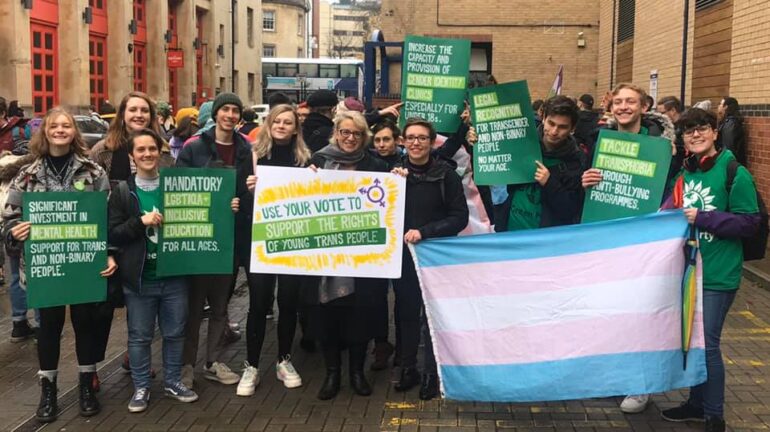Abortion Rights and Democracy
Nadine Dorries doesn’t like facts; she admits that her own blog is “70% fiction”, and has a reputation for citing urban legends in support of her own views. So here’s yet another fact that she’s sure to find objectionable: 76% of people in the UK believe that abortion should be legal. When the strength of public opinion is so overwhelmingly against her, you would think that she’s fighting a losing battle in advocating against abortion, but when someone like Nadine Dorries holds an influential position in government, it gives them the potential to not only undermine women’s rights, but to subvert democracy.
Despite what some social conservatives would have us believe, abortion is not a newfangled feminist invention. Women have been deliberately ending unwanted pregnancies for millennia, and it’s only in the last few centuries that it has become a matter for moral debate. Once, even the Catholic church thought that abortion was acceptable if carried out at a sufficiently early stage in the pregnancy, and the British government only banned the practise in the 19th century – arguably as a means of controlling women’s lives at a time when they were beginning to agitate for equality. Since then it has been a highly politicised issue, and a woman’s right to make decisions about her own body has been treated as just another bargaining chip between political factions.
One of the most extreme examples of this in recent years is in Nicaragua, where abortion has been banned completely since 2006. There are no exceptions – not even when a woman’s life is at risk – and pregnant women are not allowed to receive any medical treatment which could harm a foetus. Any woman who tries to end her pregnancy can be sentenced to up to two years in prison, which means that many women are afraid to ask for help they suffer complications after an illegal abortion. Medical professionals can face up to three years in prison, and a ban on practising for up to five years, so some doctors are afraid to treat a woman who has had a miscarriage, in case they are held responsible for the loss of a foetus. As a result, women are dying from conditions which would have been survivable just a few years ago.
Although Nicaragua is a deeply Catholic country, evidence suggests that the current abortion laws do not have the support of the general population. Earlier this year, a study found that 61% of Nicaraguans believe that abortion is justified when it would save a woman’s life, and 57% believe that it should be allowed when the foetus has severe abnormalities. So why do these laws exist? The short answer is: politics. 2006 was the year of a presidential election, and in the months before the vote, every party was anxious to keep on the church’s good side. When anti-abortion groups began campaigning for the ban, few politicians were prepared to risk the religious backlash they would incur if they opposed it. In the end, the previously pro-choice Daniel Ortega won the election, but his victory has cost Nicaraguan women dearly.
“But,” you think, “we don’t live in Central America – that kind of thing wouldn’t happen here.” Well, some people would tell you that it already has. In June 2008, Gordon Brown was trying to force legislation through parliament which would allow suspected terrorists to be detained for up to 42 days without charge, but a rebellion by Labour MPs meant that the government was struggling to get a majority. Eventually, it was the support of the Democratic Unionist Party from Northern Ireland that allowed the bill to pass through the Commons (it was later defeated in the Lords), but as they filed into the lobby, the DUP MPs were met with angry cries of “what were you paid?”. Speculation at the time suggested that their price had been a guarantee that the money raised from Northern Irish water rates would spent locally, and an agreement that Labour would give up on the idea of allowing abortion in Northern Ireland.
While women in England, Scotland and Wales have had access to legal abortions on the NHS for over forty years, the 1967 Abortion Act doesn’t apply to Northern Ireland. The current law allows a small number of medically necessary abortions to take place in Northern Ireland every year, but most women have to travel to England and pay up to £2,000 to have the procedure in a private clinic – which over 1300 did in 2007. Northern Irish politicians are almost universally vocal about not wanting the Act to be extended, despite there being evidence of broad public support for it. The Labour MP Dianne Abbot had proposed an amendment to the Human Fertilisation and Embryology Bill, which was debated in July 2008 – a few weeks after the vote on 42-day detention – to legalise abortion throughout the UK, but this amendment was never debated or voted on in parliament.
With the current fragile coalition between the Conservatives the Lib Dems, it is entirely possible that Nadine Dorries could one day be in the position to wield a disproportionate amount of power. In the midst of a backbench rebellion, Dorries – or any of her colleagues – could command a high price for their cooperation with the government. It wouldn’t let her wipe out abortion rights overnight, but it could give her more opportunities to chip away at evidence-based sex education, promote mandatory “counselling” from anti-abortion groups, or campaign for the existing time limits to be reduced. We laugh at her now, but if she manages to shift the debate closer to her own opinions, even in small increments, Nadine Dorries will very soon cease to be funny.
If there is one reason for hope in all of this, it is the backlash against social conservatism that has been provoked in the last few weeks. People who had previously taken their reproductive rights for granted have started to sit up and take note, because they are reminded that there are forces in society who would take those rights away from them. It will take more than a well-meaning appreciation for the achievements of our feminist foremothers to protect our rights, but awareness of this is the first step towards action.




I have never been on the side of Abortion. For me, it is immoral and illegal to take someone’s life. Abortion is already killing.